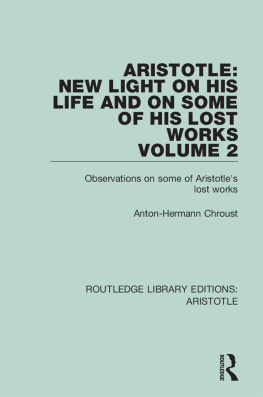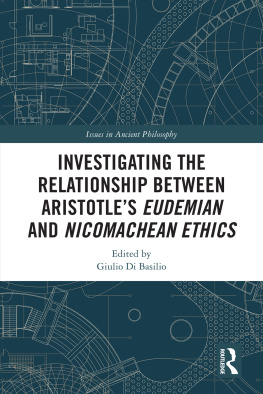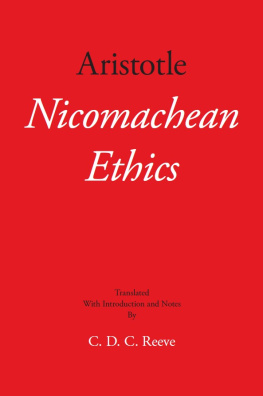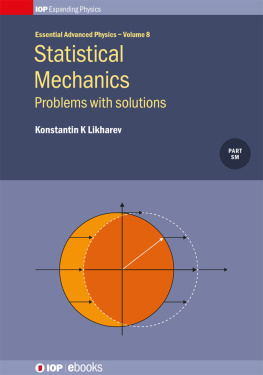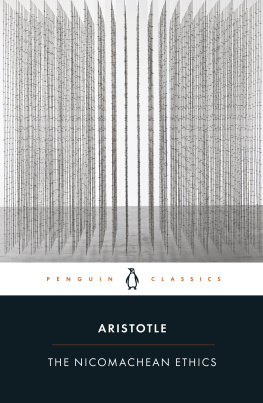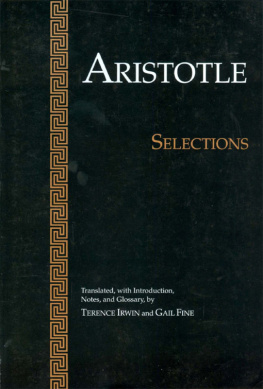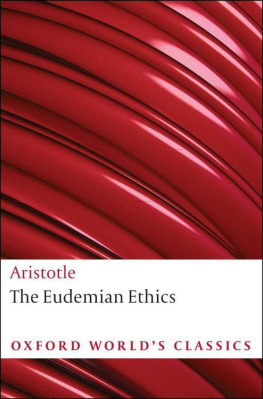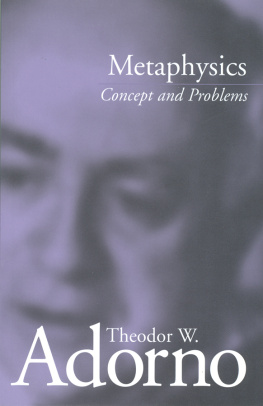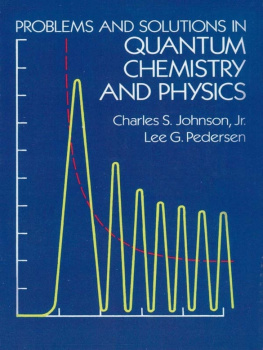
ROUTLEDGE LIBRARY EDITIONS: ARISTOTLE
Volume 2
ARISTOTLE: NEW LIGHT ON HIS LIFE AND ON SOME OF HIS LOST WORKS VOLUME 2
ARISTOTLE: NEW LIGHT ON HIS LIFE AND ON SOME OF HIS LOST WORKS VOLUME 2
Observations on some of Aristotles lost works
ANTON-HERMANN CHROUST

First published in 1973
This edition first published in 2016
by Routledge
2 Park Square, Milton Park, Abingdon, Oxon OX14 4RN
and by Routledge
711 Third Avenue, New York, NY 10017
Routledge is an imprint of the Taylor & Francis Group, an informa business
1973 Anton-Hermann Chroust
All rights reserved. No part of this book may be reprinted or reproduced or utilised in any form or by any electronic, mechanical, or other means, now known or hereafter invented, including photocopying and recording, or in any information storage or retrieval system, without permission in writing from the publishers.
Trademark notice: Product or corporate names may be trademarks or registered trademarks, and are used only for identification and explanation without intent to infringe.
British Library Cataloguing in Publication Data
A catalogue record for this book is available from the British Library
ISBN: 978-1-138-92762-9 (Set)
ISBN: 978-1-315-67490-2 (Set) (ebk)
ISBN: 978-1-138-93707-9 (Volume 2) (hbk)
ISBN: 978-1-315-67493-3 (Volume 2) (ebk)
Publishers Note
The publisher has gone to great lengths to ensure the quality of this reprint but points out that some imperfections in the original copies may be apparent.
Disclaimer
The publisher has made every effort to trace copyright holders and would welcome correspondence from those they have been unable to trace.
ARISTOTLE
New light on his life and on some of his lost works
Volume II
Observations on some of Aristotles lost works
Anton-Hermann Chroust

First published in 1973
by Routledge & Kegan Paul Ltd
Broadway House, 6874 Carter Lane,
London EC4V 5EL
Printed in Great Britain by
Richard Clay (The Chaucer Press) Ltd, Bungay, Suffolk
Copyright Anton-Hermann Chroust 1973
No part of this book may be reproduced in any form without permission from the publisher, except for the quotation of brief passages in criticism
ISBN 0 7100 7722 x
To the Memory of Roscoe Pound Teacher, Friend, Scholar
Contents
Volume II
Observations on some of Aristotles lost works
DL | Diogenes Laertius, The Lives and Opinions of Eminent Philosophers |
DH | Dionysius of Halicarnassus, I. Epistola ad Ammaeum |
VH | Vita Aristotelis Hesychii (Vita Menagiana, Vita Menagii) |
VM | Vita Aristotelis Marciana |
VV | Vita Aristotelis Vulgata (Vita Pseudo-Ammoniana, Vita Pseudo-Elias) |
VL | Vita Aristotelis Latina |
IVS | I Vita Aristotelis Syriaca (author unknown), Cod. Berol. Sachau 226 |
II VS | II Vita Aristotelis Syriaca (author unknown), Cod. Vat. Syriacus 158 |
IVA | I Vita Aristotelis Arabica (Ibn Abi Yaqub an-Nadim, Kitab al-Fihrist) |
II VA | II Vita Aristotelis Arabica (Abu-l-Wafa al-Mubassir (or Mubashir) Ibn Fatik, Kitab Mukhtar al-Hikam wa-Mahasin al-KilamThe Book of Selections from Wisdom and Beautiful Savings) |
III VA | III Vita Aristotelis Arabica (Al-Qifti Gamaladdin al-Qadi al-Akram, Tabaqat al-HukamaSchools of Wise Men) |
IV VA | IV Vita Aristotelis Arabica (Ibn Abi Usaibia, Uyun al-Anba fi Tabaqat al-AtibbaBook of Sources of Information About the Schools of Doctors) |
In the Arabic names and titles, the accents have been omitted. The Vitae Aristotelis mentioned above have been compiled and are easily accessible in I. Dring, Aristotle in the Ancient Biographical Tradition, Studia Graeca et Latina Gothoburgensia, vol. 63, no. 2 (Gteborg, 1957).
It is a matter of common knowledge that the first scholarly compilation of the many fragments, some minor parts of the Metaphysics, some parts of the Poetics and some parts of the Politics; (iii) aside from the works incorporated in the Corpus Aristotelicum (and the missing Problemata and Collection), there never existed any authentic compositions of the Stagirite; and (iv) because there never existed any lost works of Aristotle, the so-called fragments, excerpts or reports of such lost works as they are found in ancient and patristic authors, are unquestionably spurious.
When discarding in this radical and uncompromising manner all the fragments of the lost works as wholly apocryphal, Rose used what may be called a sweeping a priori approach. In regard to their form and doctrinal content, Rose insisted that these alleged fragments have a decidedly Platonic flavor. But since Aristotle was always an Aristotelian and as such was fundamentally opposed to Plato and Platonic teachings, these fragments clearly must be spurious. It has become a standard work, still used and cited in our time.
Certain aspects of Roses methods and opinions were quite unusual. He started out with the assumption that the catalogue of Aristotelian works preserved by Diogenes Laertius (DL V. 227) contained a great many apocryphal writings, and that especially the first nineteen titles are, and undoubtedly must be, entirely spurious. This being established, he rather arbitrarily assigned, without further investigation or evidence, the fragments he had already determined to be spurious to those allegedly spurious titles or works. In other words, he decreed, in a somewhat high-handed manner, frequently without much supporting evidence, fragment 15 (Rose), to the Aristotelian On Philosophy; fragment 193 (Rose), to the Aristotelian On the Pythagoreans; and fragments 1778 (Rose), to the Aristotelian Homeric Questionsalthough all these fragments likewise discuss problems related to the soul and, hence, might as well be assigned to the Eudemus or On the Soul. This particular example, which could be multiplied many times, supports the contention that Roses assignments and identifications, on the whole, are rather capricious and therefore must be considered somewhat unreliable. Nevertheless, no one will seriously deny that in terms of an authoritative collection of fragments from Aristotles lost works, Roses Aristotelis Qui Ferebantur Librorum Fragmenta (Leipzig, 1886) is of immense and lasting value as a starting point, if used with care, for scholarly investigations into the many and often desperately involved problems connected with these lost works.
By decisively influencing the vast majority of later scholars, Roses In this unusual fashion, Roses original collection, though meritorious and useful as a mere collection, has had a lasting influence on subsequent Aristotelian scholarship.
Next page
